Not ready to enrol but want to learn more?
Fill out this form and a representative from The Chang School will contact you.
Learn how to use the latest live closed captioning (CC) and audio description/described video (AD/DV) techniques and technologies to create inclusive and accessible broadcast content for a variety of audiences. Through hands-on training and theoretical learning, explore CC and AD/DV software tools, script writing and re-speaking techniques, and relevant industry regulations and legislation. Industry experts will help you develop both fundamental and advanced skills for this growing field.
This course series offers the following benefits:
- Enrol right away – open admissions with no application required
- Earn a Professional Development Award on successful completion of all required courses
- Apply for merit-based awards
What Makes Our Program Unique?
Check out these great reasons to pursue the Course Series in Inclusive Media! Our program offers:
- University-level learning
- Opportunities to gain both fundamental and advanced skills
- Practical training using specialized equipment and software
- Content that is rooted in extensive research and linked to the development of global standards for media accessibility
- Topics that cover the latest industry advancements, such as the use of artificial intelligence in captioning software
- Convenient weekend schedules
- Course lengths suited to busy professionals (courses range from 8 to 21 hours in duration)
- Expert instructors, guest speakers, and community connections who bring a mix of academic, industry, and end-user backgrounds to the classroom
NER Certification
The NER model is a quality assurance model based on the number of words captioned and different types of errors recorded. NER is taught in CDIM 101 - Closed Captioning and CDIM 103 - Closed Captioning Advanced, and students will have the opportunity to practice using this model in class.
Completion of this course series does not certify you as an NER evaluator, However, it is highly recommended that students without captioning experience take CDIM 101 and CDIM 103 in order to prepare for the external NER accreditation process. For more information about this process, contact Deborah Fels at dfels@torontomu.ca.
Who Teaches the Courses?
Our instructors are a mix of faculty and staff members from Toronto Metropolitan University and professionals currently working in the broadcast industry. Experienced and in-touch, Chang School instructors bring up-to-date knowledge to every course.
Visit the individual course pages (see the “Required Courses (select 4)” menu on this page) to find out more about our course instructors.
Advisory Committee Members
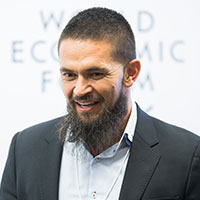 Tony Abrahams
Tony Abrahams
Tony Abrahams is co-founder and CEO of Access Innovation Media (Ai-Media).Founded in Australia in 2003 to improve the quality of life for people with disabilities, Ai-Media is a for-purpose business dedicated to using technology and social innovation to improve content accessibility.
Its internet captioning service, Ai-Live, is used at universities, colleges, schools, workplaces, and conferences, providing real-time speech-to-text delivered remotely to any connected device. Transforming the professional and educational experience of deaf and hard-of-hearing people by providing immediate access to the spoken word, Ai-Live is a flexible, scalable solution for learners with communication barriers including autism, deafness, and learning difficulties, as well as for students for whom English is an additional language.
Ai-Media has evolved to be a global technology business and now employs over 250 people worldwide, including Canada, the United States, the United Kingdom, and Norway.
Tony has served as a non-executive director of Northcott Disability Services and is a member of the Australian Institute of Company Directors. As a Rhodes Scholar, Tony received an MBA (2001) and MPhil in Economics (2000) from the University of Oxford. He received an LLB (1998), BCom (Hons I) (1996) from the University of New South Wales. In 2013, Tony was appointed as a Young Global Leader.
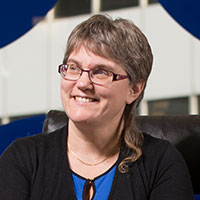 Deborah Fels
Deborah Fels
Deborah Fels has a PhD (1994) in Human Factors from Industrial Engineering at the University of Toronto. She is currently employed as a professor at the Ted Rogers School of Information Technology Management, and is the director of the Inclusive Media and Design Centre at Toronto Metropolitan University. Her research interests involve inclusive design, access to media and technology for people with disabilities and older adults, inclusive video game design, and inclusive business. Dr. Fels has published over 150 articles on inclusive technologies and applications and has received three patents. She is also a professional engineer.
Her current research projects include:
- emotive captioning
- audio description including the software tools LiveDescribe and LiveDescribe Web
- sensory substitution techniques for access to sound and visual information, including creation of a vibrotactile system, the Emoti-Chair, and a vibrotactile music facility, the VibraFusionLab
- mixed-reality gaming for older adults
- needs analysis methods that are inclusive of older adults
- video documentation and storytelling technology for older adults with chronic illness
- gamification in education
 Santiago Hidalgo
Santiago Hidalgo
Santiago Hidalgo is the director of the Laboratoire CinéMédias and an affiliate professor at the Université de Montréal. He is currently a member of the International Research Partnership on Cinema Technology (TECHNÈS) scientific committee and series editor of the Cinema and Technology book collection at Amsterdam University Press. He is co-editor of A Companion to Early Cinema (Wiley-Blackwell, 2011) and editor of Technology and Film Scholarship: Experience, Study, Theory (Amsterdam University Press, 2017). Santiago’s research focuses on early cinema, film criticism, audiovisual reception, the impact of high-paced films on children, and film consciousness.
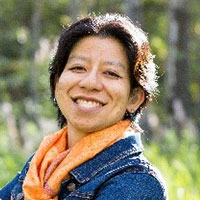 Jenny A. Leung
Jenny A. Leung
Jenny Leung is currently completing her final year at Toronto Metropolitan University’s Ted Rogers School of Management, studying in the Business Technology Management program with a minor in psychology. She is also completing her summer internship program at BMO as Technology Analyst. Jenny holds an Advanced Diploma in Business Administration from George Brown College, and plans to continue on to graduate studies with Toronto Metropolitan.
Jenny is Deaf, and she is fluent in American Sign Language and English (spoken and written). She was born in Hong Kong and moved to Calgary at the age of 5. She moved to Toronto at 17 to explore her Deaf identity and Deaf awareness, culture, and educational opportunities. Jenny completed her studies in the Business Management program at Gallaudet University for the Deaf in Washington, DC, where she was on the Dean’s List with a 3.75 GPA.
Jenny enjoys reading books on subjects that include research, business, science, and technology, and also enjoys hiking and travel.
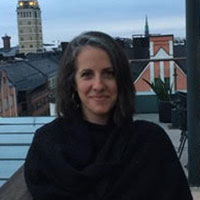 Caroline Martin
Caroline Martin
Caroline Martin is a research coordinator at the Laboratoire CinéMédias and a lecturer in cinema and literature at the Université de Montréal. She is currently acting as the elected Lecturers’ Representative of her department and actively working on developing new andragogic strategies in the field of cinema.
As a scholar, Caroline received a master’s degree in Literature (2004) from the Université du Québec à Montréal and a PhD (2019) in Art Education from Concordia University. In 2018, she was voted by the students of the Université de Montréal as one of the top five most inspiring teachers.
Her research interests involve cinema and media education, curriculum, government policies, and youth’s film reception. Her current research project, a collaboration with the Neuroscience of Early Development Lab (Ste-Justine Hospital, Montreal) is on the impact of fast-paced films on children.
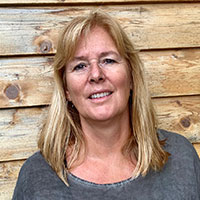 Beverley Milligan
Beverley Milligan
Beverley Milligan has worked toward increasing the accessibility of Canadian media for over 25 years, first as a closed captioner for CHCH-TV in Hamilton. She then founded Canada Caption Inc. to implement a business model for underwriting costs associated with closed captioning through coining and bringing to market the concept of “Closed captioning brought to you in part by....”. This corporate sponsorship model led to a widespread increase in closed captioning of television programming for deaf and hard-of-hearing Canadians. Beverley received the prestigious Canadian Association of Broadcasters Gold Ribbon Award for her contribution to the Canadian broadcasting industry for this body of work.
Her role in the creation and evolution of accessible media has influenced the Canadian broadcasting landscape, as well as policy development at the provincial and federal levels. Her conceptualizing and lobbying research and development funding led to the inclusion of a tangible benefit package now called the Broadcasting Accessibility Fund. While on the board of directors of the National Broadcast Reading Service, Beverley was instrumental in conceptualizing what is now Accessible Media Inc. Her tireless work in standards development has resulted in the Canadian Association of Broadcasters’ style guide for captioning; her role as co-editor of the International Organization for Standardization’s publication, DTS 20071-21 “Information Technology — User interface component accessibility — Part 21: Guidance on audio description”; and numerous other publications.
As the daughter of two deaf parents, Beverley earned a degree in Linguistics from York University. She was recognized in 2013 with the Queen Elizabeth II Diamond Jubilee Medal for her lifelong dedication to supporting innovation, entrepreneurialism, and market development in accessible media industries.
Beverley brings to the table a wealth of experience from all stakeholder perspectives.
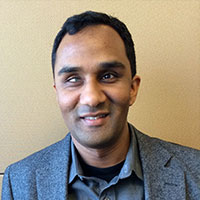 Kevin Shaw
Kevin Shaw
Kevin Shaw is an entrepreneur who understands accessibility and assertive technology from lived experience. Despite losing his vision at 19, he has carved out a successful career in live entertainment, music production, advertising, broadcast management, and digital media. Mr. Shaw founded TellMe TV, a company incubated at the DMZ at Toronto Metropoltian University until 2014. TellMe TV is the world’s first 100 percent described video on-demand service featuring movies and TV shows with audio description for people living with vision loss.
Kevin currently holds the role of Program Manager for Entrepreneurship and Innovation at the CNIB Foundation. Mr. Shaw is a proud Toronto Metropolitan University alumnus with a bachelor’s degree in Radio and Television Arts and a master’s degree in Media Production.
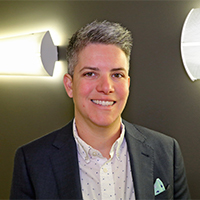 Em Williams
Em Williams
Em Williams is a passionate advocate for quality described video and media accessibility. With nearly 15 years’ experience, she leads the Media Accessibility Services department for Accessible Media Inc. (AMI) in Toronto.
Em has been integral in the research and development of Integrated Described Video (IDV), which is AMI’s inclusive approach to making visual media accessible throughout production. AMI’s IDV Best Practices Guide, to which Em contributed, won a 2017 Chairman's Award for Advancements in Accessibility from the United States' Federal Communications Commission (FCC).
Em is a committee member working to develop an audio description certification in coordination with the US-based Academy for Certification of Vision Rehabilitation & Education Professionals (ACVREP).
Course Series Requirements
- Successful completion of 4 required courses
Frequently Asked Questions
Are there any required entrance criteria for this course series?
No. There is no admission or application process for the Course Series in Inclusive Media – you can enrol in individual courses right away. CDIM 100 - Inclusive Media and Regulations must be taken as the prerequisite for all other courses in the series; see “Are there any prerequisite courses for this course series?” for more information.
Are there any bursaries or awards available to me?
Yes. The Chang School offers need-based financial aid for new and returning students. Bursaries are usually awarded based on a combination of demonstrated financial need and academic objectives/performance. You may also be eligible for certain merit-based awards.
For more information about available bursaries/awards, including application deadlines and instructions, visit Bursaries and Merit-based Awards.
Can I succeed in this course series if I don’t have a media background?
Yes. Our hope is that you will have an open mind when it comes to entertainment media access and broadcasting policies and practices, as many of these (including accessible strategies such as audio description and captioning) are embedded in ableist thinking. Some familiarity with video or audio editing software, such as Adobe Audition or Premiere Pro, would be beneficial, but this is not a requirement for success in the course series.
Our current students come from diverse backgrounds, including broadcasting, education, access, theatre, audio/video editing, information studies, and disability studies.
What are the dates and duration/length of the program?
You will complete this course series on a course-by-course basis. Courses are scheduled per term (Fall, Winter, and Spring/Summer). Course dates can be found by visiting each individual course page (see the “Required Courses (select 4)” menu on this page).
The duration of the series will depend on level of interest and your availability to take the courses when they are offered. The introductory course, CDIM 100, is 8 hours long. The fundamental and advanced skills courses, CDIM 101/102 and 103/104, are each 21 hours long. All courses are offered on the weekends.
What courses are required to complete the series?
You must take four courses to complete the series; there are five available courses from which to choose. See the “Required Courses (select 4)” menu on this page for more information about each course.
Are there any prerequisite courses for this course series?
Yes. CDIM 100 - Inclusive Media and Regulations is a requirement for all other courses. If you can demonstrate that you have extensive knowledge in the field of inclusive media, you can request an exemption from taking this course. Regardless of your background, however, we highly recommend taking this course as it provides a foundation for a broad understanding of inclusive media and the regulatory framework that has shaped our current policies and practices in broadcasting. Email Academic Coordinator Deborah Fels at dfels@torontomu.ca to request an exemption or to take CDIM 100 after taking other courses in the series (if you have a scheduling conflict).
How much do the courses cost?
The cost of each course is listed on each individual course page. (Courses not offered in a particular term will not list a cost.) Please visit the individual course pages for details.
What kind of equipment and software will I need?
See Toronto Metropolitan University’s Minimum Requirements for Remote Learning to learn about the minimum technical requirements needed to access our online learning resources.
CDIM 100 requires access to a computer for viewing media content and writing. No additional equipment or software is needed. All other courses (CDIM 101/102 and CDIM 103/104) will also require noise-cancelling headsets with a microphone and speakers. A webcam is also required.
Audio description/described video courses (CDIM 102/104) and captioning courses (CDIM 101/103) will also require additional open-source or licensed software; licensed software will be provided to students. Note: CDIM 101 and CDIM 103 will require access to a PC computer. Dragon Dictate, the speech recognition software used in these courses, is not compatible with Macintosh computers.
Contact Margot Whitfield if you have any questions about technology requirements or recommended headsets for purchase.
Will the courses be offered online and/or in person?
Courses available in the Winter 2021 and Spring/Summer 2021 terms will only be offered online. Course availability in future terms will be based on evolving regulations regarding COVID-19. Please visit the individual course pages for details.
How many hours of homework can I expect from the courses?
CDIM 100 includes two course assignments, which will each take approximately 1–3 hours to complete.
Audio description/described video courses (CDIM 102/104) will each include 3–4 assignments (at different weightings). Each assignment will take approximately 1–3 hours to complete, depending on your level of experience with voicing, scripting, and mixing (using the editing software). Time will also be allotted in class to work on assignments.
Captioning courses (CDIM 101/103) will each include 3–4 assignments (at different weightings). Each assignment will take approximately 1–3 hours to complete, depending on your level of experience with captioning and using voice recognition technology to caption. Time will also be allotted in class to work on assignments.
I’m taking a degree program at Toronto Metropolitan or another university. Can I take this course series at the same time?
Please consult the individual course pages for course dates. When planning your schedule, in addition to the course hours, consider the additional time needed outside of class time to complete assignments. For example, a 21-hour course (CDIM 101, 102, 103, 104) may run for three weekends in a row and involve approximately 3–9 additional hours in assignment completion time.
Will an intensive option be available for this course series?
This fast-track option will allow you to complete the required courses in a single term. Express interest to receive updates about future offerings of the intensive option.
Will there be note takers available for my courses?
Toronto Metropolitan University provides support for students who require academic accommodations. Visit Academic Accommodation Support for more information about available services.
What skills and knowledge are needed to enter the field of inclusive media?
It is often expected that broadcast education and experience is needed before getting into this field. Theatre and writing experience may also help with delivery (or voicing) and/or writing of audio description/described video. For captioning, recommendations include previous closed captioning, live closed captioning, court reporting, transcription, re-speaking and/or on-air journalism experience from a recognized company. Experience with professional software such as Dragon Naturally and basic working knowledge of computers and MS Office Suite are also considered an asset.
Recent job opportunities in the area of captioning recommend the following skills: excellent written and oral English communication skills; being articulate and having clear enunciation abilities and a strong speaking voice; experience with proofreading and editing text for accuracy and consistency (including spelling, grammar; and punctuation); high attention to detail; advanced problem-solving abilities; flexibility and composure to perform under pressure; knowledge of the offline closed-captioning process/company programs; native English fluency and accent; and Spanish or French fluency.
Will this course series help me in the production of a podcast?
We expect that this course series will provide you with knowledge and skills to help you in many areas other than broadcasting, including social media, production, post-production work, communications, and marketing.
Intensive Option
Fast-track this course series through our intensive option – complete the required courses in a single term. Express interest to receive updates about future offerings of this unique program.
Inclusive Media in the Media
Check out these articles and podcasts featuring our Course Series in Inclusive Media.
Article: Described video opens up world of film to the blind (Toronto Star, December 10, 2019)
Article: All prime time TV shows now have to be accessible. How Toronto could become a world leader in captioning and describing (Toronto Star, December 13, 2019)
Podcast: Audio Description in Canada (Picture This, January 3, 2021)
Presentations
Inclusive Media at the CNIB Foundation's Connecting the Dots Conference (October 2019)
Deborah Fels, the course developer for our Course Series in Inclusive Media, presented "What is CAD? (Certified Audio Describers)" at the 2019 CNIB conference. Margot Whitfield and Marie-Catherine Rombaut, lecturers in the series, presented "Inclusive Media – Real Time (CC, AD/DV)." Toronto Metropolitan University was the only post-secondary organization with accessible media course offerings to present at this conference.
Listen to them discuss their presentations and this course series with AMI's "Kelley and Company":
Interview with Deborah Fels
Interview with Margot Whitfield and Marie-Catherine Rombaut
Testimonials
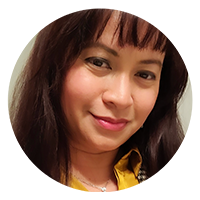 “This course series has helped me understand, evaluate, and study the needs and challenges of blind and low-vision persons and deaf individuals when it comes to their media and broadcasting accessibility and needs. I’m able to specialize and learn more about creating the needs of post-production for live media.
“This course series has helped me understand, evaluate, and study the needs and challenges of blind and low-vision persons and deaf individuals when it comes to their media and broadcasting accessibility and needs. I’m able to specialize and learn more about creating the needs of post-production for live media.
Having a small class size allowed for more personable and honest conversations with [other students]. We provided each other with constructive feedback on our work and we were able to keep each other accountable.
You could tell the instructors really cared - they were constantly encouraging us and always found a way to help us when we needed it. The instructors’ classes were so dynamic and in-depth and included guest speakers that had industry knowledge which enhanced our learning.
Completing this course series online gave me a lot of flexibility to learn from home and gave me the time I needed to complete all my projects. I didn’t feel like I was rushing and it felt [as if] there was more quality in my work.”
Joanne Santos, Course Series in Inclusive Media student
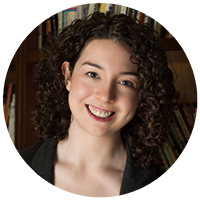 "This course series allows me to bring new skills to my work and be a champion for accessibility amongst my colleagues. The theoretical knowledge helps me advocate for a more inclusive learning and working environment.
"This course series allows me to bring new skills to my work and be a champion for accessibility amongst my colleagues. The theoretical knowledge helps me advocate for a more inclusive learning and working environment.
My instructors were very informed and passionate about their subject matter. I appreciate that some instructors approached the materials from an academic background, while others brought their practical work experience from the field. Due to our small class sizes, they were able to adapt material to the students’ interests.
We were able to tailor our learning to our specific interests and apply what was being taught to the media of our choosing. This set students up to leave the program with a portfolio of materials reflective of them, their interests, and the fields they may want to pursue with an Inclusive Media lens."
Madeline Smith, Course Series in Inclusive Media student
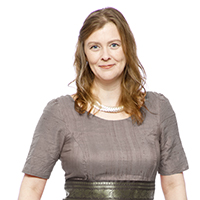 “I want to keep expanding my skills so that my career can continue to grow. There are opportunities available now that didn't exist when I first got my university degree, and I want to have a resumé that opens those doors. This course series is taught by both academics and industry insiders, and it’s scheduled on weekends with working professionals like me in mind. Having the right equipment available for all our practical work let me focus on developing my skills. The instructors are welcoming to everyone. Some of us had prior experience while others were brand new to this field; all of us were encouraged to share our knowledge and questions.
“I want to keep expanding my skills so that my career can continue to grow. There are opportunities available now that didn't exist when I first got my university degree, and I want to have a resumé that opens those doors. This course series is taught by both academics and industry insiders, and it’s scheduled on weekends with working professionals like me in mind. Having the right equipment available for all our practical work let me focus on developing my skills. The instructors are welcoming to everyone. Some of us had prior experience while others were brand new to this field; all of us were encouraged to share our knowledge and questions.
My work as an Education & Outreach Coordinator for Opera Atelier has me reaching out to different communities and audiences all the time. I'm driven by the desire to make great art available to everyone. These courses are teaching me the current best practices in my field, and they are a great way for me to add powerful new outreach tools to my professional toolkit.”
Heather Dale, Course Series in Inclusive Media student
Contact Us
Questions? Contact Deborah Fels, Academic Coordinator.
Email: dfels@torontomu.ca
